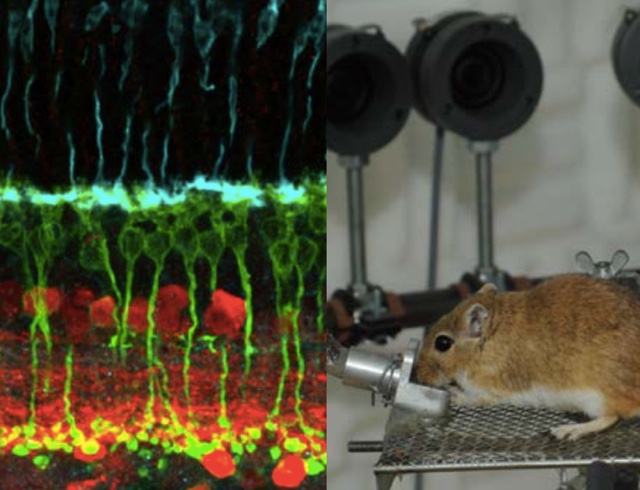Contact
Information requests about the program:
General questions regarding studies in Oldenburg:
Application Deadlines
Wintersemester 2025/2026
German/ EU degree: 15.07.2025
https://uol.de/studium/bewerben/master
Non-EU degree: 30.04.2025
Orientation week and Welcome (Downloads)
Program & Prospect
Program Overview
Students can focus on one of the following thematic areas: Sensory, Behavioural, or Computational Neuroscience or a combination of these topics.
The English-language Master's program "Neuroscience" is research-oriented and provides comprehensive and in-depth knowledge in the neurosciences from a biological point of view. In this Master's program, students acquire excellent R&D skills which prepare them for entering an international, interdisciplinary job market and provide the basis for a doctorate.
The basic knowledge of the structure and function of nervous systems is taught comparatively using animal model organisms as examples. A wide range of electives gives students the opportunity to focus on their own interests and thus develop a personal profile.
Through research-based learning, students are enabled to work scientifically in an interdisciplinary and responsible manner when dealing with technical problems and to present the results obtained in a coherent manner. Complementing neuroscience expertise, students gain cross-disciplinary skills (e.g., in programming, data analysis, and science communication) and conduct several scientific projects. In enabling students to solve complex scientific problems, the main skills developed are creativity, originality, and the ability to collaborate across disciplines. Furthermore, graduates will be able to communicate their knowledge, their conclusions and their rationally justified theses to experts and laypersons in an addressee-oriented manner. Structured, hypothesis-driven thinking, communication skills and interpersonal skills provide the basis for professional success.

Studying Neuroscience in Oldenburg
- Focus: Sensory, behavioral and computational neuroscience
- Levels: From molecule to (animal) behavior
- Science-oriented: Up to three individual student projects in research groups
- Skills-oriented: Specific skills courses complement scientific education
- Hands-on: Almost all courses include lab time or exercises
- Intensive: Focus on one topic at a time due to block course structure
- International: All courses in English, semester abroad is possible
- Interdisciplinary: Teachers & students with mixed backgrounds, joint courses with Biology & Psychology
- Flexible: Individual study plans, wide choice of courses
- Personal: Small groups, close contact to teachers and scientists
- Future perspectives in Oldenburg: Graduate school, cluster of excellence, collaborative science projects
Highlights
Our Master of Neuroscience is uniquely focussed on sensory, behavioral and computational neuroscience. The experimental work uses mainly vertebrate and invertebrate models, ranging from the molecular and cellular to the sytems and behavioral level.
Students can choose from different methodological approaches in the neurosciences:
- Molecular, cellular and developmental biology
- Electrophysiology, neuroanatomy and imaging techniques
- Behavioural experiments / psychophysics
- Statistical data analysis / modelling / simulations
Career Prospects
A successful Master's degree in Neuroscience provides evidence that you have diversified theoretical and practical skills and are able to deal with sophisticated and extensive assignments in the field of neuroscience. As the degree program is taught in English, graduates are qualified to work in an international job market. The large number of possible module combinations and individual curricula offers students to specialise for a variety of career paths in academia, as well as the public and private sector. For instance, a scientific-leading position in the pharmaceutical industry, managing occupations in research, or education orientated administration are within reach. Students that are enthusiastic about research should consider doing a PhD and lay their focus on research modules.
Sensory Neuroscience orientated curricula certify your qualification for neuroprosthetics/ neurotechnology, and modules on molecular neuroscience qualify for a position in the pharmaceutical/ medical industry. Students that are interested in data science or data management can elect modules related to data analysis and computational neuroscience. An occupation in the field of science communication or science journalism is also a possibility for students that discover their fascination for the respective skills modules or the offered science communication workshop. Within these diverse fields, you can acquire different positions, e.g. as researcher, developer, project manager, consultant or educator.
The annual “Career Day Neuroscience” gives graduates the opportunity to get an overview of possible occupational areas and connects them to neuroscientists working in the industry and in research. The elective “External Research Module” further allows students to perform an internship at an external company or research institution.

